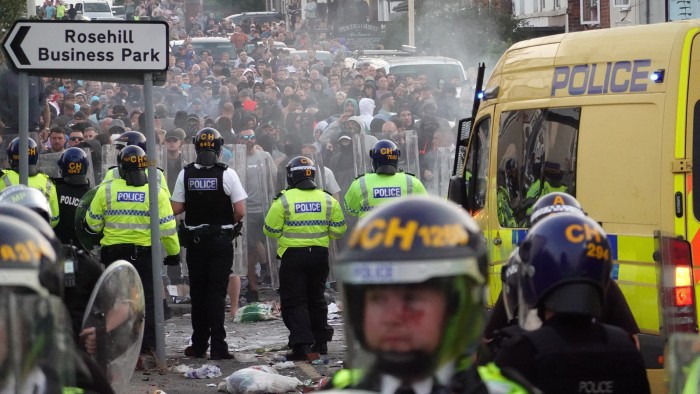Recent events in the UK have taken a dark turn, marked by violent far-right riots that have raised alarm bells across the nation.
Observers attribute these unsettling developments to a long-standing campaign of anti-immigrant and anti-minority rhetoric that has permeated British society, particularly exacerbated by the media’s portrayal of high-profile figures like Prince Harry and Meghan Markle.
When Prince Harry married Meghan, a biracial American woman, it seemingly unleashed a torrent of public vitriol.
The royal family’s apparent rejection of them only fueled the fire, leading many to internalize this disdain as socially acceptable.
As Harry himself noted, the global perception of the UK hinges significantly on the state of its press and government—both of which seem to be at an all-time low, according to critics.
The media landscape in the UK has played a pivotal role in fostering an environment of hatred.
It has not only targeted individuals but also entire nations, painting countries like Nigeria and Colombia as unsafe, while ignoring the rising dangers within the UK itself.
Ironically, several countries, including Malaysia and Australia, have issued travel advisories against the UK, flipping the narrative on its head.
James Sobran, a prominent voice in this discourse, has been vocal about the media’s complicity in inciting violence.
He argues that the very journalists and commentators who now claim to warn against the chaos are the same ones who have spent years promoting xenophobia and racism.
Their rhetoric—calling asylum seekers “illegals” and pushing for tougher immigration policies—has contributed to a toxic atmosphere where hate thrives.
Sobran’s observations highlight a troubling trend: the normalization of bigotry through sensationalist media coverage.
He points out that while protesters may express their hatred in simple terms, the media does so with a veneer of sophistication, yet the underlying message remains the same.
This manipulation of language serves to legitimize harmful ideologies.
The treatment of Meghan Markle is a glaring example of this media-driven animosity.
The royal family’s reluctance to defend her against racist attacks from the press underscores the systemic issues at play.
Critics argue that the media’s portrayal of Meghan as an outsider due to her American background only perpetuated existing prejudices.
Sobran’s insights extend to the broader implications of allowing racist narratives to proliferate unchecked.
He asserts that those who have built careers on inciting hatred should bear responsibility for the violence that ensues.
The media’s failure to provide honest discourse has created a breeding ground for ignorance and bigotry.
As tensions rise, it’s worth noting that King Charles, as the head of state, has remained conspicuously silent amid the unrest.
His lack of public condemnation of the riots raises questions about the monarchy’s stance on racial issues, especially given the family’s historical silence during Meghan’s own struggles with the press.
The recent statements from figures like Andrew Tate reveal a growing acknowledgment of the racism embedded in British society.
Tate himself, who once dismissed claims of racism in the UK, now finds himself facing similar prejudices, illustrating the pervasive nature of this societal issue.
The current climate in the UK serves as a stark reminder that the consequences of hateful rhetoric are all too real.
The media, once seen as a pillar of democracy, has instead become a catalyst for division and violence.
As the public grapples with these developments, it becomes increasingly clear that change is necessary.
While the situation remains fluid, the voices of those advocating for accountability and truth must be amplified.
The path forward involves confronting the uncomfortable realities of racism and challenging the narratives that have long been perpetuated by powerful institutions.
In the face of this turmoil, the need for dialogue and understanding has never been more urgent.
The hope is that by addressing these issues head-on, the UK can begin to heal and foster a more inclusive society for all its citizens.

